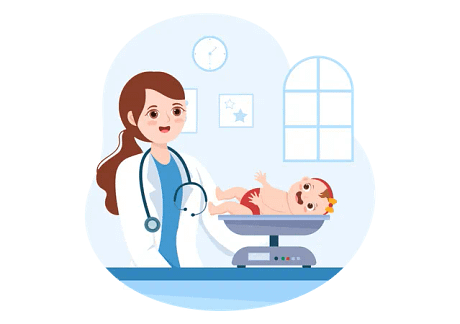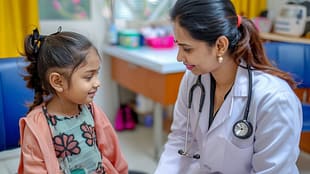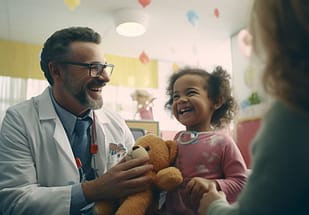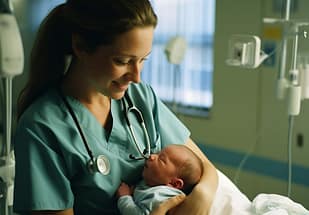
What to Expect During Your Baby’s Third Well-Child Visit (6 Weeks Old)
At six weeks, the third well-child visit offers a valuable opportunity to track your baby’s development and growth while also addressing your concerns as a parent. Below is a guide to what typically happens during this visit, ensuring your baby is on track and receiving the care needed for healthy development.

30 Key points to Expect During the Third Well-Child Visit
- Identify Risk Factors
Your doctor will ask about any potential health risks related to both the baby and parents. - Toy Safety
Ask about toy safety and ensure that toys are appropriate for the baby’s age and development. - Measure Growth
Weight, length, and head circumference will be measured and plotted on a growth chart to monitor the baby’s physical development. - Assess Parent-Child Attachment
The doctor will observe the quality of attachment and how responsive the parents are to the baby’s cues and movements. - Response to Parent Leaving and Returning
Your baby’s response when a parent leaves the room and comes back will be assessed, looking for healthy attachment behaviors. - Observe Play and Interaction
Parents’ spontaneous play and interaction with the baby will be observed. If needed, the doctor may suggest play activities and demonstrate how to engage with the baby through talking, playing, and comforting. - Review Previous Visit
The doctor will review the notes from the previous visit and check whether any specific instructions have been followed. - Review Neonatal Screening Results
If neonatal screening was not done earlier, it will be reviewed or ordered during this visit. - Discuss Health Concerns
Parents will be asked about any health concerns they may have about their baby. - Urine and Stool Pattern
The doctor will ask about the baby’s urine and stool patterns to ensure normal bowel and bladder function. - Breastfeeding Concerns
Any breastfeeding challenges, including breast or nipple pain, will be discussed, and guidance will be provided if needed. - Vitamin D Prophylaxis
Ensure that your baby is receiving vitamin D supplements, as it is essential for bone development. - Parent Confidence in Handling Baby
Both parents will be asked how confident they feel about handling and caring for the baby. - Play and Interaction with Baby
Parents will be asked how they play with and talk to the baby, emphasizing the importance of bonding through interaction. - Review Growth Chart
The updated growth chart will be interpreted to ensure the baby is developing at a healthy rate. - Physical Examination
The doctor will perform a general physical exam, focusing on jaundice, skin conditions, the umbilicus, and any birth defects. - Systemic Examination
A systemic check will be done to assess overall organ function and health. - Vision Check
The doctor will assess vision by checking for red reflex, looking for ocular abnormalities, and testing if the baby follows a dangling object. - Hearing Assessment
If needed, the otoacoustic emission (OAE) hearing test will be ordered or repeated, and if any issues are detected, an advanced auditory brainstem response (ABR) test will be recommended. - Breastfeeding Guidance
The doctor will assess breastfeeding attachment, suckling, and positioning, especially if the mother experiences pain. Any breast or nipple issues will also be addressed. - Look for Signs of Neglect
Your doctor will assess for any potential red flags of neglect, such as maternal postpartum depression or indicators of baby battering. - Immunizations
The baby will receive vaccinations according to the immunization schedule. - Exclusive Breastfeeding (EBF) Counseling
Parents will be counseled on the benefits of exclusive breastfeeding and potential consequences if it is not practiced. Guidance on maternal diet and supplements will also be provided. - Developmental Stimulation
Developmental activities according to the MCP card will be encouraged, ensuring that the baby is meeting age-appropriate milestones. - Anticipatory Guidance
The doctor will offer anticipatory guidance on how to stimulate the baby’s development, including how to talk, smile, and engage the baby through play and gentle strokes. This also includes ensuring the baby has supervised tummy time to develop their muscles and motor skills. - Preventive Health Care
Parents will receive advice on maintaining personal hygiene and proper skin care for the baby, along with safety tips to avoid burns and choking hazards. - Danger Signs
The doctor will educate parents on danger signs that require medical attention, such as difficulty breathing or unusual behavior, so they know when to seek immediate help. - Breastfeeding Check
Any concerns related to breastfeeding, such as pain, frequency, and alternative feeding methods, will be discussed to ensure both the baby and mother are comfortable. - Next Immunization
Information about the next round of immunizations will be provided, ensuring the baby stays up to date on vaccines. - Safety Precautions
Parents will be advised to avoid carrying the baby while holding hot food or drinks and be vigilant about choking risks from small objects, especially if there are older siblings in the house.
This thorough review during the third well-child visit helps ensure that your baby is growing healthily and provides parents with the guidance needed to care for and nurture their baby.










































